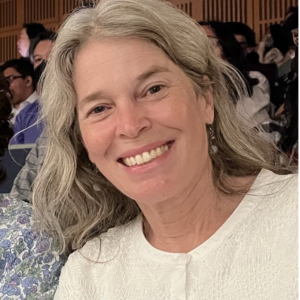Joanna is a climate justice activist based in New York City with strong ties to Berkeley, California. We sat down to chat about her role in the movement, her decades of engagement on Corporate Accountability’s campaigns, and what keeps her motivated and hopeful in the face of power and destruction.
What brought you to Corporate Accountability?
I’ve known about the organization since I was a kid. My parents adopted my sister from Vietnam in the mid-70’s, and when they learned about Nestle’s infant formula marketing campaign in the Global South, they became enraged. This was how we first started getting involved with Infact. We also joined the movement to stop nuclear war, which led us to the General Electric boycott. To this day, I’ve never purchased an appliance from GE!
What about our campaigning resonates most with you now?
My parents were both smokers and died from tobacco-related cancers at an age that I consider to be too young. I am grateful for all Corporate Accountability has done to bring Big Tobacco to account.
I’m also passionate about the climate campaign. It astounds me that so many people representing fossil fuel corporations have a seat at the policymaking table. Thousands of these lobbyists participated in the last climate treaty meetings. How is that possible?
Regardless of the issue, your approach to campaigning is targeted and strategic. From the United Nations climate treaty talks to the global tobacco treaty negotiations, you have amazing access to critical policy spaces. You are on the inside, and you are getting a lot done there.
Why is challenging corporate power important to you?
I believe that if corporations were not doing everything to maximize profits, resources would be more evenly distributed; the world would be a very different place. By focusing on the actions and responsibilities of corporations—which are not people, no matter what the Supreme Court says—we can pull on the right levers of power and change the way that the world operates.
How do you see your role in the social justice movement?
I’ve done a lot of social justice work in my life—from starting a recycling program at my college to advocating in my local community. Recently, I realized that it’s important for me to challenge oppressive systems more directly. This means being in the physical face of power. This practice comes from a Quaker tradition known as “witness.” There is power in being present where the harm is being done, and making sure the people doing the harm know that you are watching them.
What keeps you grounded as an activist and motivates you to keep going?
Doing this work makes me feel good as a person. I believe in the interconnectedness of all the issues that we face—from racism to poverty to environmental degradation.
Spending time in nature has also given me a spiritual foundation. We’ve all been given the gift of this incredible, intricate planet. I feel a responsibility to preserve and protect it.
Being rooted in these truths allows me to take action even when it feels really challenging.







